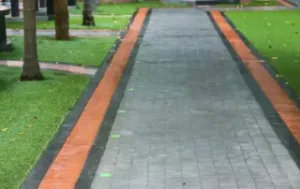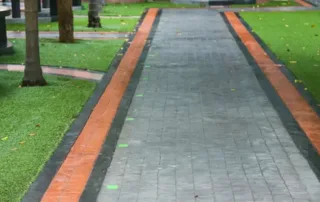Epoxy Flooring Projects In Arizona

Introduction
When you’re looking to spruce up your outdoor space or driveway, it’s natural that you will get confused with the number of options you can go with. To make things easy for you, we’re here to tell you why you should go with Concrete pavers. They’re not only budget-friendly but also offer a variety of styles to match your taste, making them your go-to option. This article will walk you through the ins and outs of concrete pavers, from the kinds available to design hacks and much more.
Varieties of Concrete Pavers
You’ll find two primary categories of concrete pavers, each boasting unique characteristics.
Lock-In Pavers
These are the titans of strength and endurance. Crafted from a robust concrete blend, they’re the top pick for driveways and busy zones. Plus, they often come with a lifetime guarantee, making them a lasting investment.
Artistic Slabs
These are your style mavens. Created from a softer concrete mix, they mimic the look of natural stones or bricks. They’re thinner than lock-in pavers and are best for patios, pathways, and spots where aesthetics trump durability.
Your Outdoor Style Makers
Did you realize that concrete pavers can double as a garden or yard decor? They can outline areas and add contrast, making your greenery or flower beds truly shine. They do more than serve a purpose; they elevate your outdoor style.
The Backstory
Lock-in pavers originated in the Netherlands post-World War II due to a scarcity of usual materials like bricks. They’ve been a European staple for over half a century, renowned for their resilience. Artistic slabs, however, are a newer invention, crafted to emulate natural stones or bricks.
Why Pick Concrete Pavers?
Here’s why you should consider concrete pavers for your next venture:
Budget-Friendly
One of the top perks of concrete pavers is their affordability. You get the elegance of natural stone without breaking the bank.
Sturdy
Lock-in pavers are super resilient and can handle heavy-duty use, making them perfect for concrete pavers driveways.
Simple Setup
These pavers have a flat base and uniform dimensions, streamlining the installation process compared to natural stones.
Minimal Upkeep
A quick sweep and an occasional rinse are generally all you need to keep them in tip-top shape.
Weather-Proof
High-quality pavers can brave icy conditions without falling apart.
Eco-Smart Choices
Some concrete pavers are porous, letting water seep through and lessening water runoff.
Designing with Large Concrete Pavers
Large concrete pavers are all the rage, and it’s easy to see why. They offer a sleek, modern vibe, and their size makes installation a breeze. Design tips include:
Inventive Gaps
Fill the spaces between large pavers with different materials like grass or gravel for a unique flair.
Mix & Match
Mix pavers of varying dimensions and hues for a visually engaging pattern and a standout space.
Eco-Friendly Concrete Pavers
Permeable pavers are an eco-conscious pick that helps manage stormwater. They let water filter through, replenishing groundwater and curbing erosion. This is not only eco-smart but also keeps your outdoor areas puddle-free.
Concrete Pavers for Driveways
For driveway applications, lock-in pavers are your best bet. They’re engineered to bear vehicle weight and offer superior grip compared to liquid concrete. Plus, they come in diverse designs and shades, letting you tailor your driveway’s appearance.
Concrete Pavers for Patios
For patios and less busy zones, artistic slabs are your top choice. They offer an organic appearance and come in multiple designs and shades. You can even mimic natural stones, giving your patio a luxe vibe without the hefty cost.
Expert Setup
Though you might think laying concrete pavers is a piece of cake, it’s wise to hire pros. They’ll ensure the pavers are evenly placed, well-sealed, and built to last. They can also offer design inspiration and material recommendations.
DIY: Yay or Nay?
If you’re a DIY enthusiast, small projects like pathways or patios might be doable. But for driveways or expansive areas, it’s best to leave it to the experts. They have the right gear and know-how for a durable setup.
Maintenance Tips:
While concrete pavers are easy to care for, they’re not entirely fuss-free. They can soak up stains like oil, which might need a deep clean with a degreaser and power washer. Some folks opt to apply a sealer to fend off stains but remember, sealers need reapplication every few years.
Conclusion
Concrete pavers are a stellar mix of durability, cost-efficiency, and visual charm. Whether you’re eyeing a new driveway or a chic patio, the right paver type and design can transform your space. With a multitude of choices and customization options, concrete pavers are a savvy pick for any outdoor revamp.
FAQs:
1. How long do concrete pavers last?
Lock-in pavers often come with a lifetime warranty, making them a long-lasting choice. With proper care, they can last for decades.
2. Are concrete pavers eco-friendly?
Yes, some types of concrete pavers are permeable, allowing water to pass through and reducing runoff. This makes them an eco-friendly choice for your outdoor spaces.
3. How do I clean my concrete pavers?
A simple sweep and occasional wash are usually enough. For tougher stains like oil, you may need a degreaser and a pressure washer.
4. Can concrete pavers handle heavy traffic?
Absolutely, especially the lock-in type. They’re designed to withstand heavy-duty use, making them ideal for driveways and other high-traffic areas.
5. Do concrete pavers get slippery when wet?
Quality pavers are designed to be slip-resistant, offering better traction than traditional concrete, especially when wet.
6. What’s the cost of installing concrete pavers?
The cost can vary depending on the type of paver, the complexity of the design, and labor costs in your area. Always get a free estimate before starting your project.
7. What’s the difference between concrete pavers and stamped concrete?
Concrete pavers are individual units, offering more flexibility in design and easier repairs. Stamped concrete is a single slab that can crack over time and is harder to repair.

